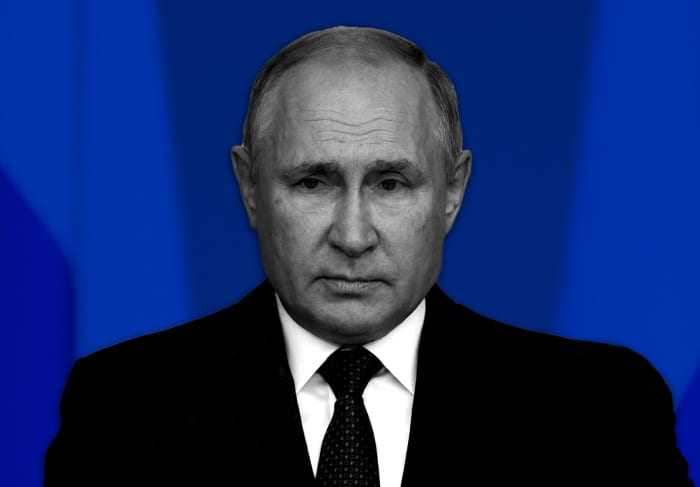Enemy Propaganda Update: Ukraine / Putin
February 25, 2022 in News by RBN Staff
Source: Market Watch
Putin, the usually cool and calculating former-KGB agent, uses Kim Jong-Un-level rhetoric. It’s a gamble that he hopes will pay off.
Putin has always argued that his hand has been forced because of efforts to bring Ukraine into NATO or align itself more decidedly to the West
With Thursday’s invasion of Ukraine, Russia is no longer operating in the shadows and its intentions are now fully in view for the world to see.
“Whoever tries to impede us, let alone create threats for our country and its people, must know that the Russian response will be immediate and lead to the consequences you have never seen in history,” President Vladimir Putin threatened in a fiery speech declaring war on Ukraine.
It was a Kim Jong-Un-level threat that is even more striking in its departure from years of Putin’s steely-eyed and calculating approach to geopolitics, which while often inscrutable, typically had a logic that could at least be understood.
It’s been a long eight-years since Putin began his slow-bore Ukrainian invasion but his alarming ratcheting up of rhetoric and aggression reveal how big a gamble he is willing to take to restore Russian dominion over its neighbors. It also leaves wide open the question about how far he is willing to go.
The gamble comes down to how much Western resolve there is to stop him.
Putin has always argued that his hand has been forced because of efforts to bring Ukraine into NATO or align itself more decidedly to the West. But as he short-circuited any such move in 2014, he now sees he can move more forcefully in Ukraine with impunity as the West has no treaty-bound obligation to come to Kyiv’s defense.
Putin’s inflammatory rhetoric is designed remind the Western nations of the limits with which they are faced — short of going to war in Ukraine, sanctions so far seem the only option. And it’s unclear how much of an impact they will have in terms of stopping Russia’s advance.
The Russian president’s gamble comes down to how much Western resolve there is to stop him. In Ukraine, there is likely none. Putin has already de facto taken a firmer position over its neighbor, Belarus, permanently stationing troops there and launching attacks from its territory into Ukraine. But does Putin stop there?
At the start, Russia’s efforts to destabilize Ukraine were opportunistic, targeted and often bumbling.
Russia’s adventures in Ukraine began shortly after the ouster of the country’s Russian-friendly president, Viktor Yanukovych, following the violent put down of pro-Western demonstrations that left hundreds dead.
Sensing instability, Moscow snatched the Crimean peninsula swiftly using covert commandos in unmarked uniforms who caught Ukrainian officials completely off guard. Putin then moved his intention to Ukraine’s Russian-speaking, industrial east.
Moscow attempted to whip up what could arguably be viewed as genuine separatist movements in the regions of Donetsk and Luhansk. The Ukrainians fought back, however, and the ramshackle effort — despite aid from Russian agents and mercenaries behind the scenes — was curtailed. Similar attempts to foment uprisings in Kharkiv and Odessa failed and the Ukrainian military managed to regain some territory.
But everytime Ukraine appeared to be gaining the upper hand, Moscow would send more and better weapons to the irregular forces it was backing. Soon, Ukrainian aircraft were being shot down from higher and higher heights. This culminated in the accidental shooting down of Malaysian Airlines Flight 17 by inept separatist forces operating a sophisticated anti-aircraft battery they didn’t know how to properly use, killing 298 people.
The fight had remained in stasis for years, with Moscow slowly bleeding the Ukrainian economy by depriving it access to its coal and iron mines and industrial infrastructure in the east and forcing it to spend heavily on its defense. Yet, Kyiv remained defiant and focused on maintaining its independence.
Now, Putin has decided he no longer has to operate in the shadows or pretend he is doing anything but taking over his neighbor.
Lukas I. Alpert is a financial crimes reporter for MarketWatch, and a former Moscow correspondent for The Wall Street Journal.















